Module 4 Rules and suggestions Unit 3 Language in use课件(外研版九年级下册)
文档属性
| 名称 | Module 4 Rules and suggestions Unit 3 Language in use课件(外研版九年级下册) |

|
|
| 格式 | pptx | ||
| 文件大小 | 3.4MB | ||
| 资源类型 | 试卷 | ||
| 版本资源 | 外研版 | ||
| 科目 | 英语 | ||
| 更新时间 | 2024-03-28 00:00:00 | ||
图片预览

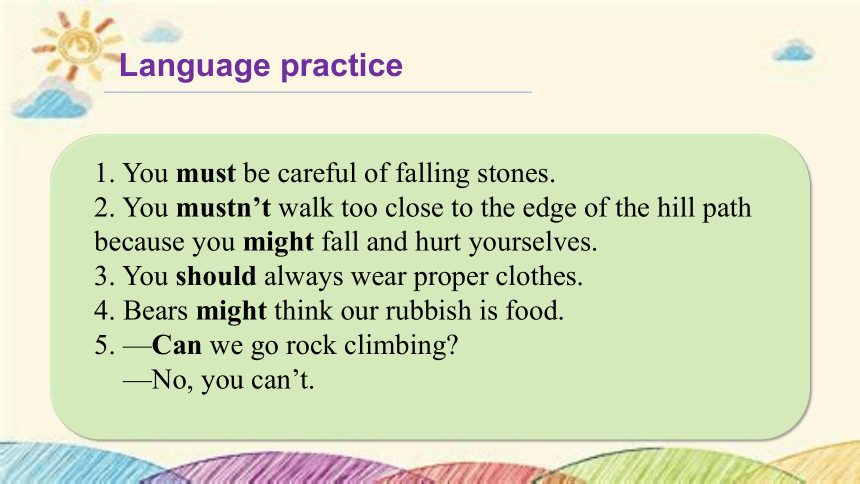
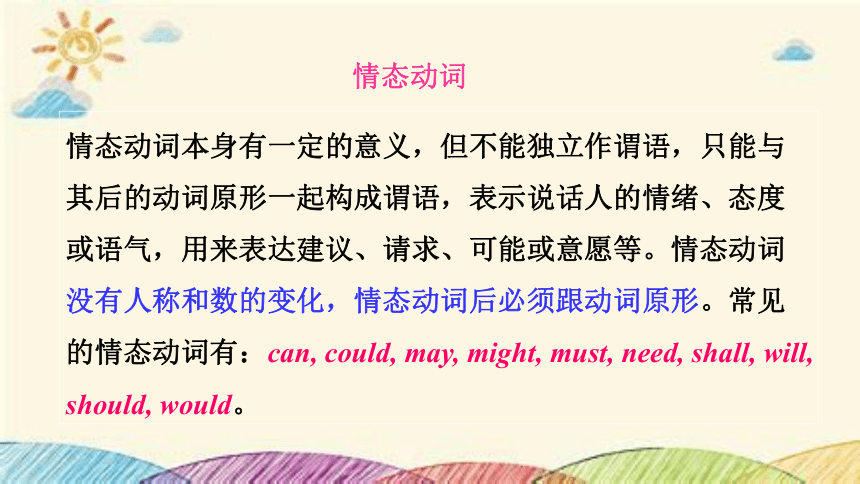
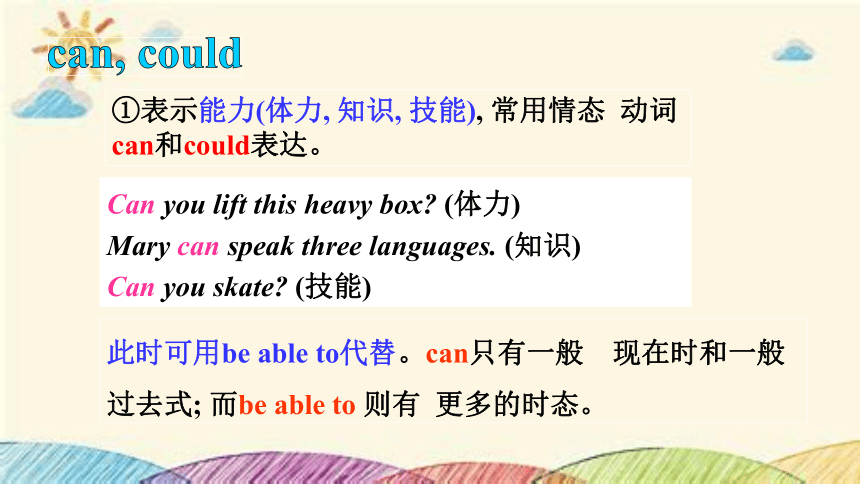

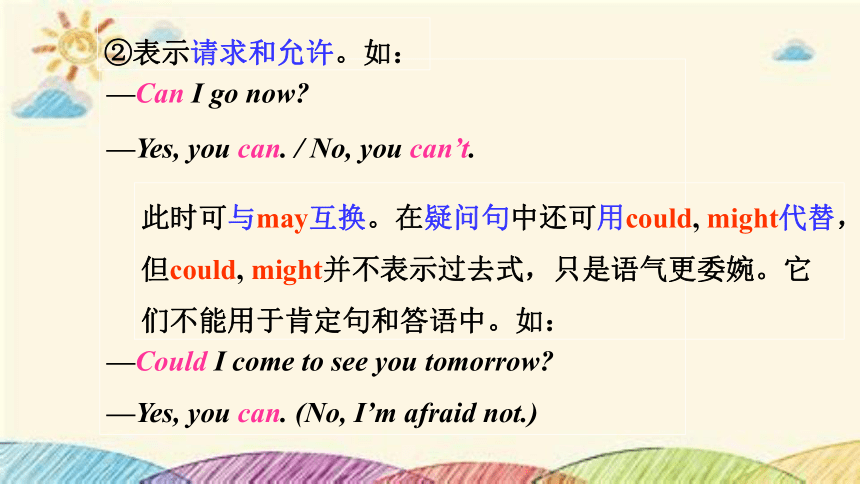


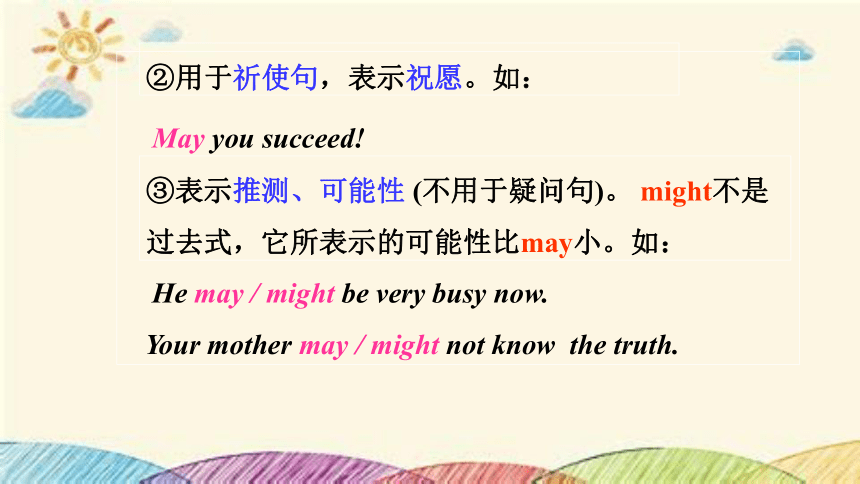
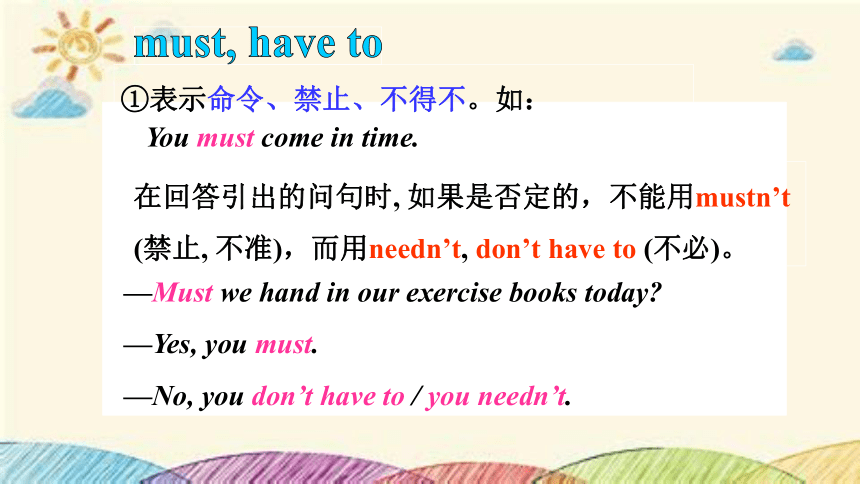
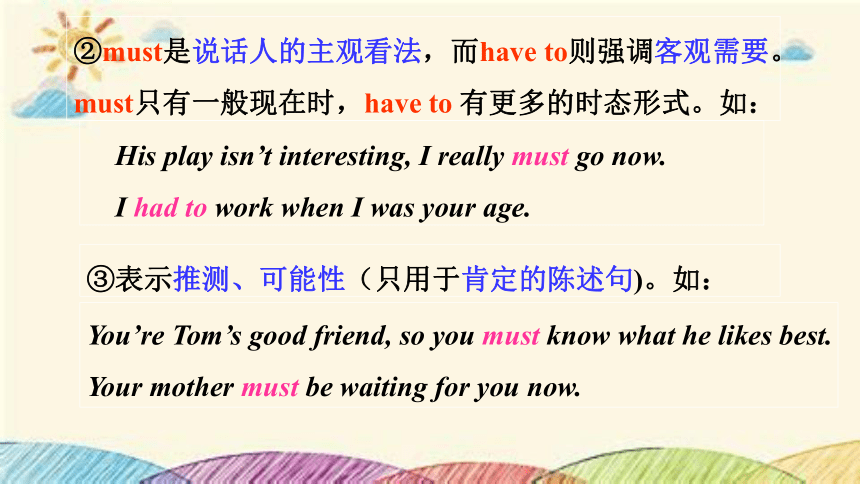
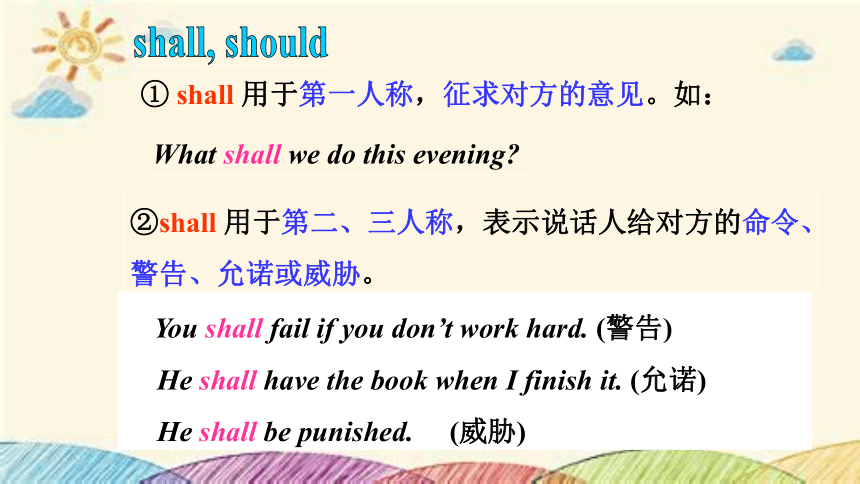
文档简介
(共34张PPT)
Module 4 Rules and suggestions
Unit 3 Language in use
Language practice
1. You must be careful of falling stones.
2. You mustn’t walk too close to the edge of the hill path because you might fall and hurt yourselves.
3. You should always wear proper clothes.
4. Bears might think our rubbish is food.
5. —Can we go rock climbing
—No, you can’t.
情态动词本身有一定的意义,但不能独立作谓语,只能与其后的动词原形一起构成谓语,表示说话人的情绪、态度或语气,用来表达建议、请求、可能或意愿等。情态动词没有人称和数的变化,情态动词后必须跟动词原形。常见的情态动词有:can, could, may, might, must, need, shall, will, should, would。
情态动词
Can you lift this heavy box (体力)
Mary can speak three languages. (知识)
Can you skate (技能)
can, could
此时可用be able to代替。can只有一般 现在时和一般过去式; 而be able to 则有 更多的时态。
①表示能力(体力, 知识, 技能), 常用情态 动词can和could表达。
如:I’ll not be able to come this afternoon. (一般将来时)
He was able to go to the party yesterday evening in spite of the heavy rain.
当表示“经过努力才得以做成功某事”时用be able to, 不能用can。如:
—Can I go now
—Yes, you can. / No, you can’t.
—Could I come to see you tomorrow
—Yes, you can. (No, I’m afraid not.)
此时可与may互换。在疑问句中还可用could, might代替,但could, might并不表示过去式,只是语气更委婉。它们不能用于肯定句和答语中。如:
②表示请求和允许。如:
They’ve changed the timetable, so we can go by bus instead.
This hall can hold 500 people at least.
③表示客观可能性(客观原因形成的能力)。如:
Can this be true
This can’t be done by him.
How can this be true
④表示推测 (惊讶、怀疑、不相信的态度) ,用于疑问句、否定句和感叹句中。
—Might / May I smoke in this room
—No, you mustn’t.
—May / Might I take this book out of the room
—Yes, you can. (No, you can’t /mustn’t. )
may, might
用May I ...?征徇对方许可时比较正式和
客气,而用Can I ...?在口语中更常见。
①表示请求和允许。might比may语气更委婉,而不是过去式。否定回答时可用can’t 或mustn’t,表示“不可以,禁止”。如:
May you succeed!
He may / might be very busy now.
Your mother may / might not know the truth.
②用于祈使句,表示祝愿。如:
③表示推测、可能性 (不用于疑问句)。 might不是过去式,它所表示的可能性比may小。如:
You must come in time.
—Must we hand in our exercise books today
—Yes, you must.
—No, you don’t have to / you needn’t.
must, have to
在回答引出的问句时, 如果是否定的,不能用mustn’t (禁止, 不准),而用needn’t, don’t have to (不必)。
①表示命令、禁止、不得不。如:
His play isn’t interesting, I really must go now.
I had to work when I was your age.
You’re Tom’s good friend, so you must know what he likes best.
Your mother must be waiting for you now.
②must是说话人的主观看法,而have to则强调客观需要。must只有一般现在时,have to 有更多的时态形式。如:
③表示推测、可能性(只用于肯定的陈述句)。如:
You shall fail if you don’t work hard. (警告)
He shall have the book when I finish it. (允诺)
He shall be punished. (威胁)
shall, should
②shall 用于第二、三人称,表示说话人给对方的命令、警告、允诺或威胁。
① shall 用于第一人称,征求对方的意见。如:
What shall we do this evening
Will / Would you pass me the ball, please
I will never do that again. They asked him if he would go abroad.
will, would
②表示意志、愿望和决心。如:
①表示请求、建议等,would更委婉。如:
Durin the vacation, he would visit me
every other day.
The wound would not heal.
It would be about ten o’clock when she left home.
③would表示过去反复发生的动作或某种倾向。would表示过去习惯时比used to 正式,且没有“现已无此习惯”的含义。如:
④表示估计和猜想。如:
I should help her because she is in trouble.
You ought to take care of the baby.
You should / ought to go to class right away.
Should I open the window
should, ought to
①should, ought to表示“应该”,ought to表示义务或责任,比should语气重。
②表示劝告、建议和命令。should, ought to可通用,但在疑问句中常用should。
③表示推测
should/ ought to 客观推测
must 主观推测
He must be home by now. (断定他已到家)
He ought to/should be home by now. (不太肯定)
This is where the oil must be. (直爽)
This is where the oil ought to/should be. (含蓄)
Match the signs with the rules and warnings.
1. No smoking.
2. No eating or drinking.
3. Children crossing.
4. Danger! Be careful of falling rocks.
5. Children should be taken care of by parents.
6. Do not drink and drive.
c
b
d
e
f
a
London Indoor Climbing Centre
Visitors please note:
Dos
Check in at the main gate when you come to the center.
Climb with someone.
Wear a hard hat at all times.
Wear the correct climbing shoes.
Wear comfortable clothes.
Read the lists of rules and write sentences
using must, mustn't, should or shouldn't.
02
Don’ts
Don’t climb without a rope.
Don’t eat or drink anywhere except in the restaurant.
Don’t listen to personal music players while climbing.
Don’t talk on a mobile phone while climbing.
Answers:
You must check in at the main gate when you come to the center.
You must climb with someone.
You must wear a hard hat at all times.
You must wear the correct climbing shoes.
You should wear comfortable clothes.
You mustn’t climb without a rope.
You mustn’t eat or drink anywhere except in the restaurant.
You shouldn’t listen to personal music players while climbing.
You mustn’t talk on a mobile phone while climbing.
1. Why must you climb with someone
2. Why must you wear comfortable clothes
3. Why mustn’t you climb without a rope
4. Why shouldn’t you listen to music while climbing
—Why must you check in when you come to the centre
—Because they want to know who is there.
Work in pairs. Explain why the rules in Activity 2 are important
03
People are very (1) _______ about the conditions of the ancient forests of Canada and want to save them. Many visitors to the forests use knives to cut their names into the trees, some of which are hundreds of years old.
worried
although keep stream tourist worry
Complete the passage with the correct form of the words in the box.
04
(2) ________ there are litter bins, people still throw rubbish into the (3) ______ and this causes plants and fish to die.
People from local villages have helped clean up the forests. We hope (4) _______ will play their part in (5) _______ Canada’s forests clean too!
tourists
keeping
Although
stream
1. You should _______________________.
2. You shouldn’t _____________________.
3. You must _________________________.
4. You mustn’t ______________________.
Now write possible rules for visitors to the forests
1. Come and visit me _________ you have time.
2. The wall is made of ______.
3. The path to the top is not very _______.
4. Remember to take a ____ with you to sleep in, because it might rain.
whenever
sticks
smooth
tent
Complete the sentences with the words in the box
gun smooth sticks stone sudden tent whenever
05
5. He lifted up the _____ and pointed it at the bear.
6. There was a ______ noise in the woods and we all stopped moving.
7. Birds use small ______ and leaves to make a home.
gun
sudden
stones
1. Is Zhang Wenpeng’s school a green one
Yes, it is.
2. What should we do when we leave a room
We should turn off the light.
Listen to Part 6 and answer the questions
06
1. What does Zhang Wenpeng try say with his drawing
People must wake up to the fact that pollution is causing damage to the progress we’ve made.
2. What does Zhou Zhiyun try to say with his painting
People must not waste electricity.
Read the passage and answer the questions.
3. What does the school suggest the students should do
The students should pass on what they have learnt in school to their parents and neighbours.
4. How can a school become a “green school”
A school must include education about the environment as part of the timetable.
1. The first thing you have to do is to
______________ carefully.
2. Think about where ____________________
and whether there are ___________________.
3. You should only take marked ________.
plan the work
you are going to work
clearly marked paths
paths
Listen and complete the sentences.
07
4. Make sure you know where ___________ for lunch.
5. Don’t forget to tell people to _________ for the picnic.
6. Don’t walk when it is ________ or in _________________.
7. You must not try out a ___________ with a group.
you can stop
bring food
too hot
very bad weather
new work
Ecotourism
Ecotourism is also known as “responsible tourism”. It means you visit places without damaging the environment. Many countries around the world have started ecotourism holidays and trips. Tourists help the local communities look after their natural environment. Here are some rules of ecotourism.
Dos
Take rubbish away with you.
Walk on paths or roads.
Take photos but nothing else.
Don’ts
Don’t pick flowers or damage trees.
Don’t pollute rivers or streams.
Don’t make open fires in the forests.
Module 4 Rules and suggestions
Unit 3 Language in use
Language practice
1. You must be careful of falling stones.
2. You mustn’t walk too close to the edge of the hill path because you might fall and hurt yourselves.
3. You should always wear proper clothes.
4. Bears might think our rubbish is food.
5. —Can we go rock climbing
—No, you can’t.
情态动词本身有一定的意义,但不能独立作谓语,只能与其后的动词原形一起构成谓语,表示说话人的情绪、态度或语气,用来表达建议、请求、可能或意愿等。情态动词没有人称和数的变化,情态动词后必须跟动词原形。常见的情态动词有:can, could, may, might, must, need, shall, will, should, would。
情态动词
Can you lift this heavy box (体力)
Mary can speak three languages. (知识)
Can you skate (技能)
can, could
此时可用be able to代替。can只有一般 现在时和一般过去式; 而be able to 则有 更多的时态。
①表示能力(体力, 知识, 技能), 常用情态 动词can和could表达。
如:I’ll not be able to come this afternoon. (一般将来时)
He was able to go to the party yesterday evening in spite of the heavy rain.
当表示“经过努力才得以做成功某事”时用be able to, 不能用can。如:
—Can I go now
—Yes, you can. / No, you can’t.
—Could I come to see you tomorrow
—Yes, you can. (No, I’m afraid not.)
此时可与may互换。在疑问句中还可用could, might代替,但could, might并不表示过去式,只是语气更委婉。它们不能用于肯定句和答语中。如:
②表示请求和允许。如:
They’ve changed the timetable, so we can go by bus instead.
This hall can hold 500 people at least.
③表示客观可能性(客观原因形成的能力)。如:
Can this be true
This can’t be done by him.
How can this be true
④表示推测 (惊讶、怀疑、不相信的态度) ,用于疑问句、否定句和感叹句中。
—Might / May I smoke in this room
—No, you mustn’t.
—May / Might I take this book out of the room
—Yes, you can. (No, you can’t /mustn’t. )
may, might
用May I ...?征徇对方许可时比较正式和
客气,而用Can I ...?在口语中更常见。
①表示请求和允许。might比may语气更委婉,而不是过去式。否定回答时可用can’t 或mustn’t,表示“不可以,禁止”。如:
May you succeed!
He may / might be very busy now.
Your mother may / might not know the truth.
②用于祈使句,表示祝愿。如:
③表示推测、可能性 (不用于疑问句)。 might不是过去式,它所表示的可能性比may小。如:
You must come in time.
—Must we hand in our exercise books today
—Yes, you must.
—No, you don’t have to / you needn’t.
must, have to
在回答引出的问句时, 如果是否定的,不能用mustn’t (禁止, 不准),而用needn’t, don’t have to (不必)。
①表示命令、禁止、不得不。如:
His play isn’t interesting, I really must go now.
I had to work when I was your age.
You’re Tom’s good friend, so you must know what he likes best.
Your mother must be waiting for you now.
②must是说话人的主观看法,而have to则强调客观需要。must只有一般现在时,have to 有更多的时态形式。如:
③表示推测、可能性(只用于肯定的陈述句)。如:
You shall fail if you don’t work hard. (警告)
He shall have the book when I finish it. (允诺)
He shall be punished. (威胁)
shall, should
②shall 用于第二、三人称,表示说话人给对方的命令、警告、允诺或威胁。
① shall 用于第一人称,征求对方的意见。如:
What shall we do this evening
Will / Would you pass me the ball, please
I will never do that again. They asked him if he would go abroad.
will, would
②表示意志、愿望和决心。如:
①表示请求、建议等,would更委婉。如:
Durin the vacation, he would visit me
every other day.
The wound would not heal.
It would be about ten o’clock when she left home.
③would表示过去反复发生的动作或某种倾向。would表示过去习惯时比used to 正式,且没有“现已无此习惯”的含义。如:
④表示估计和猜想。如:
I should help her because she is in trouble.
You ought to take care of the baby.
You should / ought to go to class right away.
Should I open the window
should, ought to
①should, ought to表示“应该”,ought to表示义务或责任,比should语气重。
②表示劝告、建议和命令。should, ought to可通用,但在疑问句中常用should。
③表示推测
should/ ought to 客观推测
must 主观推测
He must be home by now. (断定他已到家)
He ought to/should be home by now. (不太肯定)
This is where the oil must be. (直爽)
This is where the oil ought to/should be. (含蓄)
Match the signs with the rules and warnings.
1. No smoking.
2. No eating or drinking.
3. Children crossing.
4. Danger! Be careful of falling rocks.
5. Children should be taken care of by parents.
6. Do not drink and drive.
c
b
d
e
f
a
London Indoor Climbing Centre
Visitors please note:
Dos
Check in at the main gate when you come to the center.
Climb with someone.
Wear a hard hat at all times.
Wear the correct climbing shoes.
Wear comfortable clothes.
Read the lists of rules and write sentences
using must, mustn't, should or shouldn't.
02
Don’ts
Don’t climb without a rope.
Don’t eat or drink anywhere except in the restaurant.
Don’t listen to personal music players while climbing.
Don’t talk on a mobile phone while climbing.
Answers:
You must check in at the main gate when you come to the center.
You must climb with someone.
You must wear a hard hat at all times.
You must wear the correct climbing shoes.
You should wear comfortable clothes.
You mustn’t climb without a rope.
You mustn’t eat or drink anywhere except in the restaurant.
You shouldn’t listen to personal music players while climbing.
You mustn’t talk on a mobile phone while climbing.
1. Why must you climb with someone
2. Why must you wear comfortable clothes
3. Why mustn’t you climb without a rope
4. Why shouldn’t you listen to music while climbing
—Why must you check in when you come to the centre
—Because they want to know who is there.
Work in pairs. Explain why the rules in Activity 2 are important
03
People are very (1) _______ about the conditions of the ancient forests of Canada and want to save them. Many visitors to the forests use knives to cut their names into the trees, some of which are hundreds of years old.
worried
although keep stream tourist worry
Complete the passage with the correct form of the words in the box.
04
(2) ________ there are litter bins, people still throw rubbish into the (3) ______ and this causes plants and fish to die.
People from local villages have helped clean up the forests. We hope (4) _______ will play their part in (5) _______ Canada’s forests clean too!
tourists
keeping
Although
stream
1. You should _______________________.
2. You shouldn’t _____________________.
3. You must _________________________.
4. You mustn’t ______________________.
Now write possible rules for visitors to the forests
1. Come and visit me _________ you have time.
2. The wall is made of ______.
3. The path to the top is not very _______.
4. Remember to take a ____ with you to sleep in, because it might rain.
whenever
sticks
smooth
tent
Complete the sentences with the words in the box
gun smooth sticks stone sudden tent whenever
05
5. He lifted up the _____ and pointed it at the bear.
6. There was a ______ noise in the woods and we all stopped moving.
7. Birds use small ______ and leaves to make a home.
gun
sudden
stones
1. Is Zhang Wenpeng’s school a green one
Yes, it is.
2. What should we do when we leave a room
We should turn off the light.
Listen to Part 6 and answer the questions
06
1. What does Zhang Wenpeng try say with his drawing
People must wake up to the fact that pollution is causing damage to the progress we’ve made.
2. What does Zhou Zhiyun try to say with his painting
People must not waste electricity.
Read the passage and answer the questions.
3. What does the school suggest the students should do
The students should pass on what they have learnt in school to their parents and neighbours.
4. How can a school become a “green school”
A school must include education about the environment as part of the timetable.
1. The first thing you have to do is to
______________ carefully.
2. Think about where ____________________
and whether there are ___________________.
3. You should only take marked ________.
plan the work
you are going to work
clearly marked paths
paths
Listen and complete the sentences.
07
4. Make sure you know where ___________ for lunch.
5. Don’t forget to tell people to _________ for the picnic.
6. Don’t walk when it is ________ or in _________________.
7. You must not try out a ___________ with a group.
you can stop
bring food
too hot
very bad weather
new work
Ecotourism
Ecotourism is also known as “responsible tourism”. It means you visit places without damaging the environment. Many countries around the world have started ecotourism holidays and trips. Tourists help the local communities look after their natural environment. Here are some rules of ecotourism.
Dos
Take rubbish away with you.
Walk on paths or roads.
Take photos but nothing else.
Don’ts
Don’t pick flowers or damage trees.
Don’t pollute rivers or streams.
Don’t make open fires in the forests.
同课章节目录
- Module 1 Travel
- Unit 1 We toured the city by bus and by taxi
- Unit 2 It's a long story.
- Unit 3 Language in use
- Module 2 Education
- Unit 1 They don't sit in rows.
- Unit 2 What do I like best about school?
- Unit 3 Language in use
- Module 3 Life now and then
- Unit 1 They sometimes work harder.
- Unit 2 I think life is better today.
- Unit 3 Language in use.
- Module 4 Rules and suggestions
- Unit 1 You must be careful of falling stones.
- Unit 2 we must keep the camp clean.
- Unit 3 Language in use.
- Revison A
- Module 5 Look after yourself
- Unit 1 We'd better get you to hospital.
- Unit 2 Get off the sofa!
- Unit 3 Language in use.
- Module 6 Eating togethe
- Unit 1 When is the school-leavers' party?
- Unit 2 Knives and forks are used for most Western
- Unit 3 Language in use
- Module 7 English for you and me
- Unit 1 Have you ever been to an English corner?
- Unit 2 We all own English.
- Unit 3 Language in use
- Module 8 My future life
- Unit 1 Here's to our friendship and the future
- Unit 2 I know that you will be better at maths.
- Unit 3 Language in use
- Revison B
